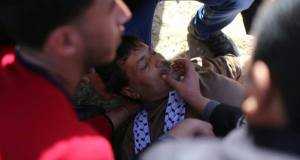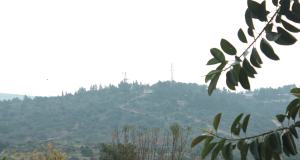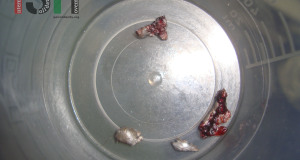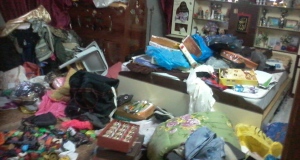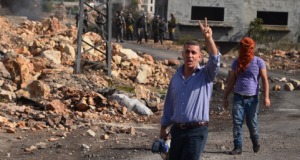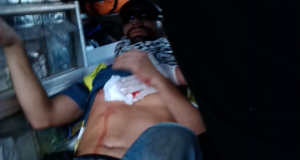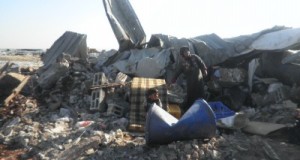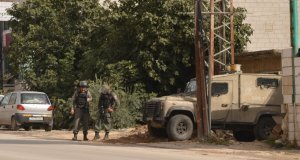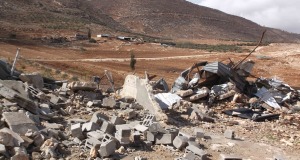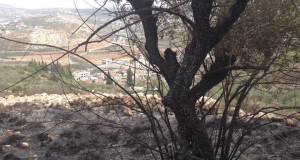11th December 2014 | International Solidarity Movement | Turmusaya, Occupied Palestine Yesterday, an Israeli soldier killed Palestinian Authority (PA) Settlment minister, Ziad Abu Ein, at a non-violent demonstration in the village of Turmusaya. ISM spoke to Abdallah Abu-Rahme, coordinator of ...
Read More »Palestinian family’s home invaded, two youths arrested by Israeli soldiers in Azzun village
11th December 2014 | International Solidarity Movement, Nablus team | Azzun, Occupied Palestine At 3 am, on the 8th of December in Azzun whilst the Radwan family slept, dozens of Israeli soldiers surrounded their house and broke in. They damaged the door as they ...
Read More »Journalist most recent victim of Israeli military violence at Kufr Qaddum
9th December 2014 | International Solidarity Movement, Nablus team | Kufr Qaddum, Occupied Palestine Bashar, a journalist from Palestine TV, was shot in the left leg at Kufr Qaddum on Friday the 5th of December 2014. The weekly demonstration aims ...
Read More »More young men and teenagers arrested by the Israeli military
9th December 2014 | International Solidarity Movement, Nablus team | Nablus, Occupied Palestine On December 8th in Nablus, the Israeli army broke into the homes of two families in Balata refugee camp and arrested two young Palestinians, 19-year-old Mujahed al ...
Read More »Israeli military court sentences Murad Eshtewi to 10 months in prison and a 10,000 NIS fine for participating in Kufr Qaddum protests
4th December 2014 | Popular Struggle Coordination Committee | Kafr Qaddum, Occupied Palestine Salem military court has sentenced activist Murad Eshtewi, from Kufr Qaddum village, to 9 and a half months of prison, with an additional 10,000 shekel fine. Israeli forces arrested ...
Read More »UPDATED: 18-year-old Palestinian and ISM volunteer both shot in the chest with .22 live ammunition
28th November 2014 | International Solidarity Movement | Kufr Qaddum, Occupied Palestine Update 12th December: The Italian activist know as Patrick is returning today to demonstrate in Kufr Qaddum. Last Friday, while Patrick was still hospitalised, the residents of Kufr ...
Read More »Home demolition orders issued in Qalqilya
24th November 2014 | International Solidarity Movement, Nablus Team | Hajja, Occupied Palestine On Monday November 17th, the Israeli occupation army invaded the village of Hajja, in the Qalqilya district and issued five home demolition orders. The village of Hajja includes ...
Read More »Military places curfew on Huwwara village, arrests two young men, and raids Palestinian homes
5th November 2014 | International Solidarity Movement, Nablus Team | Huwwara, Occupied Palestine On Friday the 31st of October, approximately 300 Israeli soldiers invaded the village of Huwwara, near Nablus. They fired tear gas canisters and stun grenades, seemingly in attempt ...
Read More »Israeli forces demolish three houses, and several water pipes and roads in village near Nablus
4th November 2014 | International Solidarity Movement, Nablus Team | Khirbet Al-Tawil, Occupied Palestine Early on Monday morning, while the inhabitants of the village of Khirbet Al-Tawil, near Aqraba (Nablus), were sleeping, eight military vehicles, and 30-40 Israeli soldiers entered the village. Within ...
Read More »Zionist settlers burn Palestinian olive grove
22nd October 2014 | International Solidarity Movement, Nablus team | Huwwara, Occupied Palestine This morning at approximately 09:30, settlers from the illegal settlement of Yizhar set fire to a Palestinian olive field above Huwwara village, just outside of Nablus. The settlers ...
Read More » International Solidarity Movement Nonviolence. Justice. Freedom.
International Solidarity Movement Nonviolence. Justice. Freedom.
